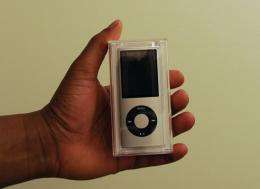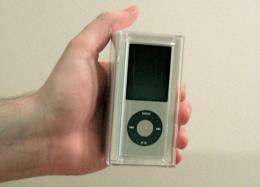Classified ads featuring a black person’s hand holding an iPod being advertised for sale received 13 percent fewer responses and 17 percent fewer offers than ads showing the iPod held by a white hand. Courtesy of Jennifer Doleac and Luke Stein
(PhysOrg.com) -- When a seller's race is evident in an online classified ad for an iPod nano, black sellers receive fewer offers and less money than white sellers, says a new Stanford study.
Online shoppers are more likely to buy from a white seller than a black one, according to a study by two Stanford researchers who posted ads on local classified advertising websites across the United States.
The ads offered the latest version of the iPod nano for sale, with each ad containing a photo of either a dark- or light-skinned hand holding the popular digital music player. The ads with a black hand received 13 percent fewer responses and 17 percent fewer offers than ads showing a white hand. Black sellers were also offered less money for the iPods than white sellers.
"We were really struck to find as much racial discrimination as we did," said Jennifer Doleac, one of the researchers and a doctoral candidate in economics. "On average it's a younger, more educated group of people shopping online and if anything they probably discriminate less than the population as a whole."
"We suspect that the negative effect of race would be even larger in the general population," she said.
Doleac and fellow researcher Luke Stein, also a doctoral candidate in economics, ran ads in more than 300 locales, ranging from small towns to major cities, during the course of a year.
The study showed that black sellers were at the greatest disadvantage in the Northeast, where they received 32 percent fewer offers than whites. In the Midwest, black sellers got 23 percent fewer offers, and they got 15 percent fewer in the South. The West was the only region where the difference in the number of offers received by black and white sellers was not statistically significant.
Buyers responding to classified ads of an iPod for sale made offers 2 percent to 4 percent lower when the iPod was shown being held by a black hand instead of a white hand. Courtesy of Jennifer Doleac and Luke Stein
The amount of money offered black sellers was between 2 percent and 4 percent less than the offers white sellers received. The disparity was most pronounced when the ads were posted in locales with high crime rates or where blacks and whites were geographically isolated from each other.
In general, black sellers were at much less of a disadvantage when the ads were posted in more competitive markets, where larger numbers of iPods were for sale, Doleac said.
The iPod listed in the ads was always a silver, 8-gigabyte version of the most recent edition of the nano, which also plays videos. Each ad stated that the box had never been opened and the iPod was for sale because the seller did not need it.
Doleac and Stein never met with the buyers in person. Instead, when it came time to set up a meeting, the researchers said they were out of town and offered to ship the iPod to a buyer's home, which produced another striking disparity.
Potential buyers corresponding with black sellers were 44 percent less likely to agree to have the iPod shipped to them and were 56 percent more likely to express concern about sending payment to the seller by PayPal.
Doleac and Stein interpreted the buyers' reluctance as indicating a lack of trust in the sellers. The would-be buyers were also 17 percent less likely to include their name in emails when they responded to ads placed by black sellers.
"The results were obviously disappointing in terms of what they said about the state of society," Stein said.
Because they never met with any of the buyers, Doleac and Stein have no information on the race of the respondents.
In order to collect as much information as they could about relevant outcomes, and in order to honestly follow through on their advertisements, the two researchers carried the transactions through to completion, shipping an iPod to each highest bidder with whom they reached an agreement.
Doleac and Stein varied the asking price of the iPods, posting prices of $90, $110 and $130. Regardless of the posted price, the offers received by black sellers were lower than those received by whites. The 8-gigabyte nano normally retails for $149.
The researchers also varied the quality of the writing in the ads, as a way to convey the seller's socioeconomic status.
"We wanted to see if buyers might discriminate less if they thought it was a highly educated person placing the ad, rather than a person with a low level of education," Doleac said. "But it turns out people just didn't seem to care about the typos in the ads.
"The emails that we got back from people were far, far more typo-ridden than anything we put online," she said. "The people who wrote us back as buyers, they dashed off whatever the first thing that came to mind was. There was no proofreading of the emails."
But, Doleac said, they can't conclude that the quality of writing in the ad, and implicitly the seller's level of education, would never affect the responses. It may be that the differences in the quality of the writing simply weren't dramatic enough to produce an effect, she said.
"Our main finding is that when you completely isolate the effects of race on market outcome, it looks like black sellers do worse," Doleac said.
"The fact that we found this much evidence of racial discrimination in this population of people is striking," she said.
Provided by Stanford University




















